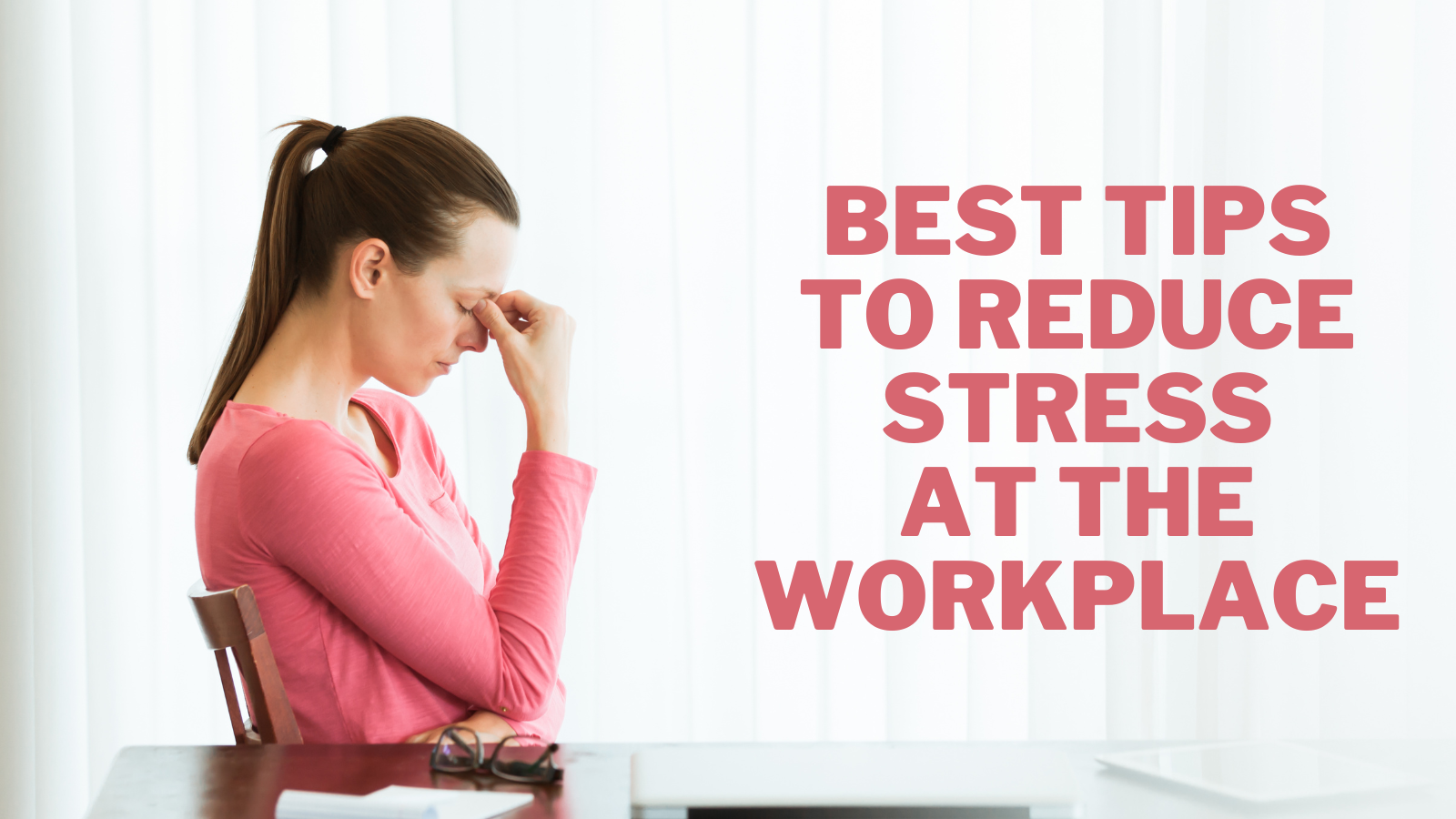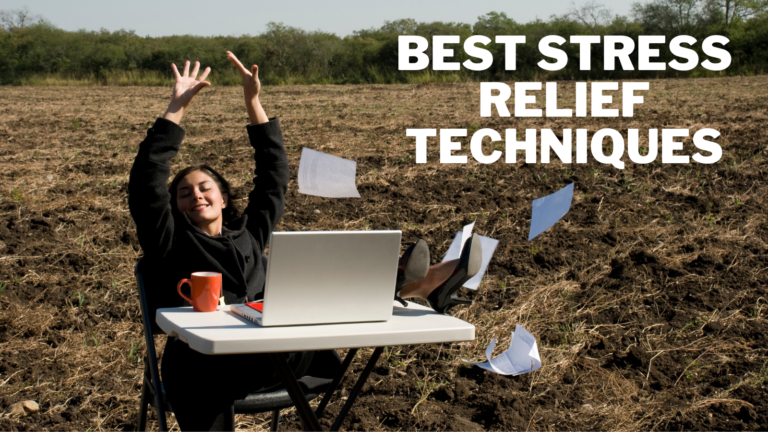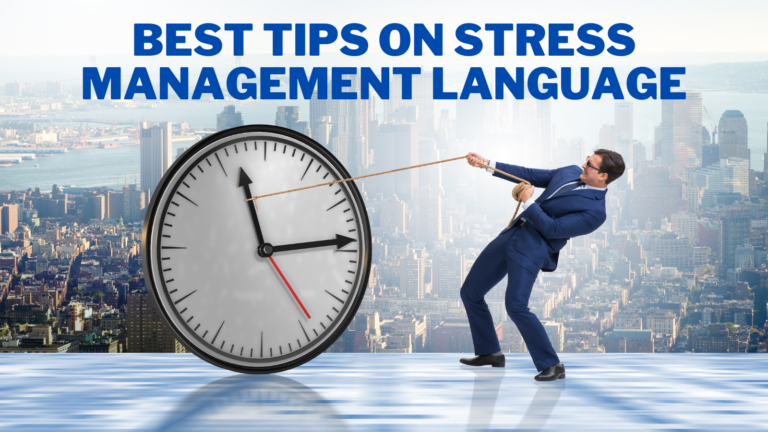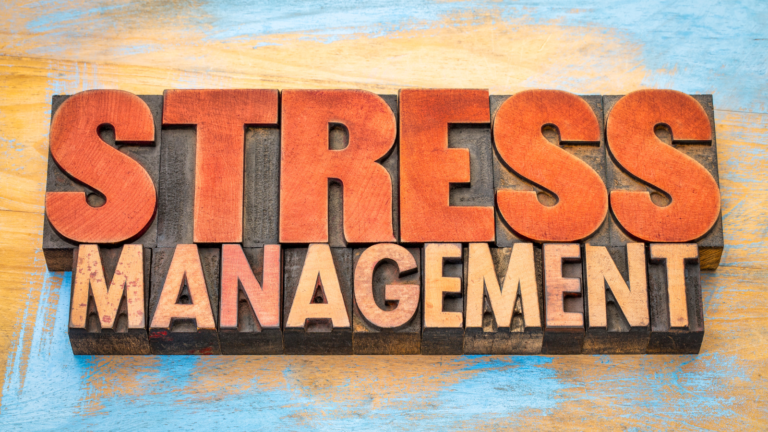Best Tips To Reduce Stress At The Workplace
Best Tips To Reduce Stress At The Workplace
Stress is a common issue in the workplace that affects many individuals. Excessive stress can lead to decreased productivity, poor job satisfaction, and even physical and mental health issues.
However, various ways exist to manage and reduce stress levels at work. In this blog post, we will explore some effective tips to reduce stress in the workplace and improve your overall well-being.

What Is Workplace Stress
Workplace stress refers to the physical, emotional, and mental strain employees may experience due to work-related conditions.
Various factors, including workload, interpersonal relationships, job insecurity, lack of support or recognition, and unrealistic expectations, can cause it.
Workplace stress can significantly impact an individual's health, well-being, and job performance, making it an important issue for employees and employers to address.
Effective strategies for preventing and managing workplace stress include providing a supportive work environment, setting clear expectations, and promoting work-life balance.

Tips To Reduce Stress At the Workplace
Reducing stress at the workplace is crucial for maintaining a healthy and productive work environment.
1. Practice Time Management
One effective way to reduce stress in the workplace is to practice good time management. Poor time management can overwhelm and stress employees, who may need help balancing their workload and meeting deadlines.
By practicing effective time management, employees can reduce stress and increase productivity. Making a to-do list and prioritizing duties is one method for efficient time management. Employees can remain organized and concentrated on their most crucial tasks.
Employees can feel less overwhelmed and more in charge of their workload by dividing large tasks into smaller, more manageable tasks.
Putting duties in order of importance and urgency can also aid workers in staying on task and meeting deadlines.

2. Take Breaks
Taking breaks is an important strategy for reducing stress in the workplace. Employees working long periods without a break may experience physical and mental fatigue, decreased productivity, and increased stress.
Employees can relax and recharge by taking short breaks throughout the day, improving physical and mental health and increasing productivity.
One effective way to take a break is to go for a walk. Walking can help clear the mind, reduce stress, and improve physical health. Even a short walk around the office or outside can be beneficial.

3. Practice Relaxation Techniques
Relaxation techniques such as deep breathing, meditation, and yoga can reduce workplace stress. Employees feeling stressed may experience physical symptoms such as tension, headaches, and increased heart rate.
Relaxation techniques can help reduce these symptoms and promote relaxation, improving physical and mental health.
Simple relaxation methods like deep breathing can be practiced anywhere. To practice deep breathing, take a few deep breaths via your nose, hold them briefly, and gently let them out through your mouth. This can help slow the heart rate and promote relaxation.

4. Exercise Regularly
Regular exercise can be an effective way to reduce stress and improve overall health. These natural chemicals increase pleasure and well-being and release during exercise.
Exercise can also aid in promoting relaxation and easing muscle tension, which will benefit both physical and emotional health.
Finding an exercise routine that works for you can be key to making it a regular habit. This could include walking daily, hitting the gym a few times a week, or taking a yoga class.
It's important to find an exercise routine that fits your schedule and is enjoyable for you, as this can help make it a regular habit.
5. Communicate Effectively
Effective communication skills are essential in reducing stress and improving relationships in the workplace.
Miscommunication and conflicts with colleagues can lead to anxiety, decreased productivity, and a negative work environment.
Effective communication skills involve actively listening to others, expressing oneself clearly, and respecting others' opinions and perspectives.
By listening actively, one can ensure they understand the other person's point of view correctly and avoid misunderstandings.
It's important to express oneself so that others may understand what is being said and there is no misunderstanding.
Respecting others' opinions and perspectives can help prevent conflicts and promote positive relationships.
Effective communication can also build trust and respect among colleagues, leading to a more positive work environment.
When colleagues feel heard and respected, they are more likely to feel motivated and engaged, increasing productivity and job satisfaction.

6. Set Boundaries
Setting boundaries is an important aspect of reducing stress in the workplace. Without clear boundaries, individuals may feel overwhelmed by too many tasks or responsibilities, increasing stress levels.
Learning to say no to tasks outside one's responsibilities or workload effectively sets boundaries.
Communicating clearly with colleagues and supervisors about one's workload and limitations is important. By doing so, individuals can avoid taking on more than they can handle and prevent burnout.
7. Take Care Of Your Physical Health
Taking care of physical health is an important aspect of reducing stress in the workplace. Proper sleep, nutrition, and hydration are essential for managing stress and maintaining well-being.
Getting enough sleep is crucial for reducing stress levels. Stress management may become more difficult due to higher stress hormone levels brought on by lack of sleep.
Aiming for seven to eight hours of sleep each night is essential to help the body regenerate and lower stress levels.
Eating a well-balanced diet can also help reduce stress levels. Eating foods high in sugar or caffeine can lead to energy crashes and increased stress levels.
On the other hand, eating a diet that includes fruits, vegetables, lean proteins, and whole grains can help regulate blood sugar levels, providing sustained energy throughout the day.

8. Practice Positive Self-Talk
Positive self-talk is a technique to challenge negative thoughts and replace them with positive ones. It can help reduce stress and increase self-confidence.
Practicing positive self-talk can be done in many ways, such as repeating affirmations, focusing on strengths rather than weaknesses, and reframing negative thoughts into positive ones.
Adopting a positive mindset makes individuals more likely to feel optimistic and motivated, which can help reduce stress levels.
9. Seek Support
It's important to recognize when you feel overwhelmed and seek help when necessary. This could mean talking to a trusted colleague, friend, or family member about what's causing your stress.
Having someone listen to you can alleviate some pressure and provide a fresh perspective. Additionally, seeking support from a mental health professional may sometimes be necessary.
A therapist or counsellor can provide guidance and support to help manage stress and improve overall well-being.
Remember, seeking support is a sign of strength, not weakness, and can help improve your ability to cope with stress in the long term.
10. Create A Positive Work Environment
Creating a positive work environment involves several practices that can help reduce employee stress levels.
One way to achieve this is by celebrating successes and milestones within the workplace.
Recognizing and rewarding hard work and achievements can increase employee motivation and satisfaction.
Regular feedback and recognition for a well-done job can create a positive work environment. This can include acknowledging individual contributions as well as team efforts.
Employees who feel valued and appreciated are more likely to feel satisfied and less stressed.

11. Practice Mindfulness
Mindfulness is a state of awareness that involves being fully present in the moment without judgment or distraction.
Mindfulness can help reduce stress levels and improve focus, making it an effective strategy for managing workplace stress.
One way to practice mindfulness is through meditation. Meditation involves sitting or lying in a quiet space, focusing on breathing.
We can cultivate a sense of calm and relaxation by paying attention to our breathing. Guided meditations, available through various apps and websites, can be helpful for those new to meditation.
Exercises that involve deep breathing are another method of practicing awareness. A deep breath is inhaled slowly through the nostrils and exhaled slowly through the mouth. We can slow down our heart rate and lessen tension and anxiety by concentrating on breathing.
There are numerous methods of practicing awareness besides meditation and deep breathing, including body scans, yoga, and mindful walking.
The key is to find a practice that resonates with you and to make it a regular part of your routine.
12. Build Supportive Relationships
Creating a supportive work environment reduces workplace stress and fosters a positive and productive atmosphere.
Building supportive relationships with your colleagues can greatly contribute to this environment.
Cultivating positive relationships involves several key aspects, such as collaboration, idea sharing, and seeking feedback.
When you collaborate with your colleagues and actively share ideas, you foster a sense of teamwork and create opportunities for innovation.
Seeking feedback from your colleagues and being open to constructive criticism helps you improve your performance and shows that you value their opinions.
Effective communication, active listening, and respectful interactions are also important in building supportive relationships.
Additionally, showing appreciation for your colleagues' efforts and contributions, celebrating successes together, and engaging in team-building activities can create a sense of community and foster a positive work culture.
Being supportive, empathetic, and willing to lend a helping hand to your colleagues further enhances the supportive environment at work.
Building positive relationships with colleagues can create a work environment where employees feel valued, supported, and motivated, reducing workplace stress and improving overall well-being.
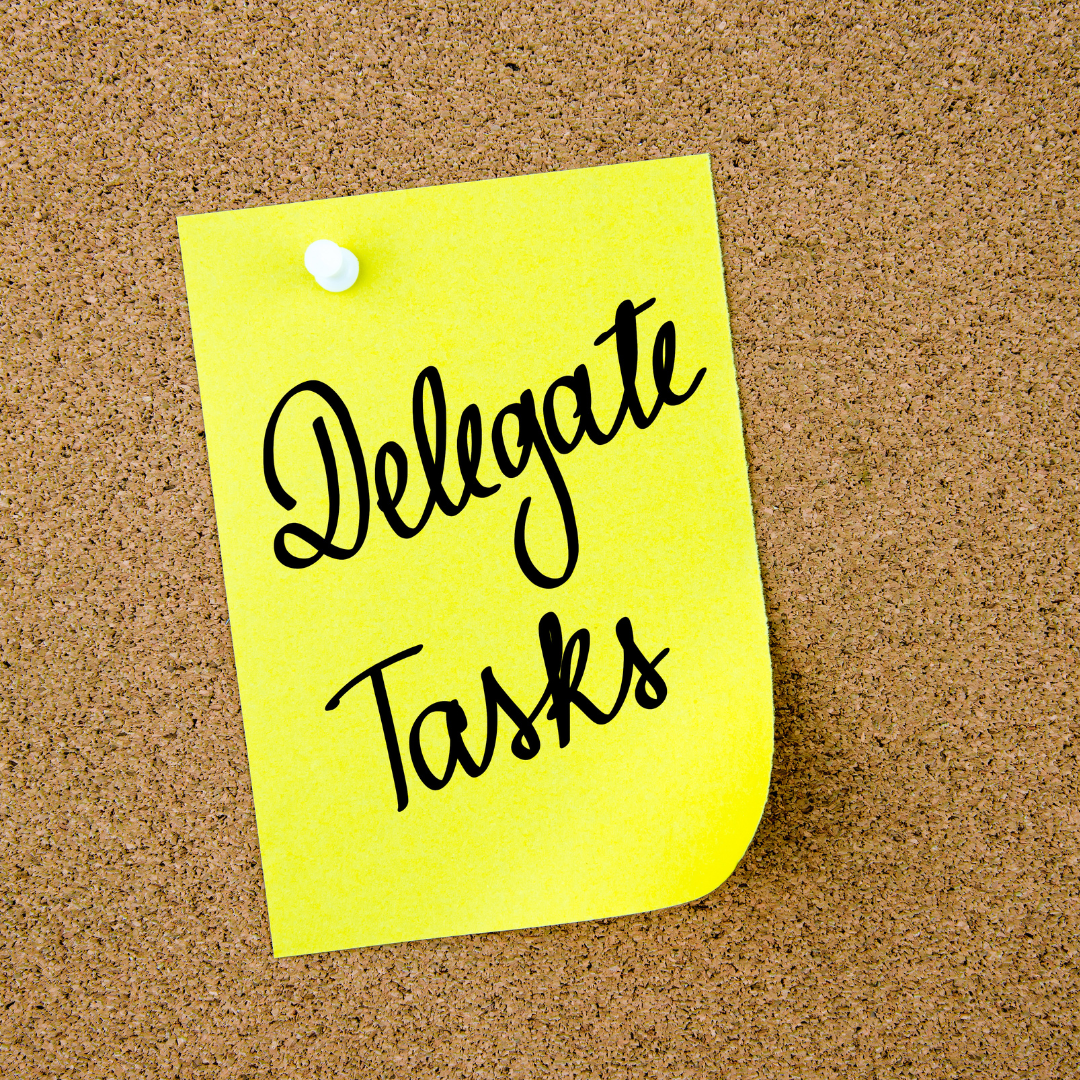
13. Learn To Delegate
Delegating tasks to others is an important skill for reducing workplace stress. Employees often feel the need to take on too many responsibilities and tasks, leading to overwhelming and increased stress levels. Learning to delegate effectively can help distribute the workload and reduce stress.
One key step in effective delegation is identifying tasks that can be delegated. Take a close look at your workload and identify tasks that could be more time-consuming, repetitive, or directly related to your core responsibilities.
Make a list of tasks that can be delegated and prioritize them based on their importance and urgency.
Next, choose capable colleagues or team members to whom you can delegate tasks. Look for individuals with the skills and capabilities to handle the tasks you want to delegate.
Consider their expertise, experience, and workload before assigning tasks to them. Ensure the person you delegate is capable and motivated to complete the tasks.
When delegating tasks, be clear and specific about your expectations. Communicate the scope of the task, the desired outcome, any deadlines or timelines, and the level of autonomy or decision-making authority the person has.
Provide all the necessary information and resources needed to complete the task successfully.
Offer support and guidance to the person to whom you delegated tasks. Be available to answer questions, provide clarifications, and offer feedback.
Regular feedback and recognition for a well-done job can motivate and empower the person to complete the tasks effectively.
Once you have delegated tasks, trust the person to handle them. Avoid micromanaging and resist the urge to take over the tasks.
Allow the person to take ownership of the delegated tasks and give them the autonomy to complete them in their own way, as long as they align with the expectations communicated earlier.
Follow up on the progress of the delegated tasks and evaluate the results. Provide constructive feedback and address any challenges or issues that may arise.
Learn from the experience and use it as an opportunity to refine your delegation skills for future tasks.

14. Take Vacations
Regular vacations help you disconnect from work, relax, and rejuvenate. Holidays allow you to take a break from work-related stressors and responsibilities and mentally and physically recharge.
On vacation, you can enjoy activities, spend quality time with loved ones, and prioritize self-care. This break from work can help reduce stress, anxiety, and burnout, allowing you to return to work with increased focus, creativity, and productivity.
Taking vacations also promotes a healthy work-life balance, helps improve mental and physical well-being, and can contribute to overall job satisfaction.
So, prioritize regular breaks as part of your self-care routine to manage workplace stress and enhance your well-being.
15. Laugh And Have Fun
Laughter and fun are powerful stress-relieving tools that can help improve mood, reduce tension, and boost overall well-being.
Finding ways to incorporate laughter and enjoyment into your workday can be an effective way to reduce workplace stress.
You can share jokes or funny stories with colleagues during breaks, engage in light-hearted conversations, or participate in team-building activities that promote laughter and fun.
Additionally, taking short breaks to engage in activities that make you happy, such as listening to music, playing a game, or engaging in a hobby, can help break up the monotony of work and give you a mental and emotional boost.
Laughter and fun help reduce stress, promote positive colleague relationships, and create a more enjoyable work environment.
So, don't underestimate the power of laughter and fun in reducing workplace stress and enhancing your overall well-being.
16. Limit Distractions
Distractions can hinder productivity and increase stress levels at work. Taking steps to minimize distractions in your workspace can help you stay focused and reduce stress.
Start by turning off unnecessary notifications, such as email or social media, on your devices to avoid constant interruptions.
Close irrelevant tabs on your computer that may tempt you to switch tasks or distract you from your current work.
Additionally, create a quiet environment whenever possible by minimizing noise or finding a secluded space to work in, especially if you need to concentrate on a task that requires your full attention.
By reducing distractions in your workspace, you can promote concentration, productivity, and efficiency, which can help alleviate stress and allow you to complete your work more effectively.
So, take the time to declutter your workspace and create an environment that fosters focus and minimizes distractions to reduce workplace stress.

17. Practice Gratitude
Practicing gratitude can be a powerful tool for cultivating a positive mindset and reducing workplace stress.
By focusing on the positive aspects of your work, such as accomplishments, supportive colleagues, or growth opportunities, you can shift your mindset from stress to appreciation.
Take time each day to reflect on and acknowledge what you are grateful for in your work environment.
This can be as simple as expressing gratitude for a kind word from a colleague, a successful project completion, or a supportive team atmosphere.
You can also keep a gratitude journal where you jot down things you are grateful for in your work life.
By practicing gratitude, you can shift your attention away from stressors and foster a positive outlook, which can help you manage workplace stress more effectively.
Gratitude can also enhance your overall well-being and increase your resilience in the face of challenges at work.
So, make it a habit to practice gratitude in your work life and see how it positively impacts your mindset and reduces workplace stress.

Conclusion
Reducing stress in the workplace is essential for maintaining a healthy and productive work environment.
Excessive stress can lead to decreased productivity, poor job satisfaction, and even physical and mental health issues.
Employees can reduce stress levels and improve their well-being by implementing effective stress management strategies.
Remember to
- Practice time management
- Take frequent breaks
- Practice relaxation techniques
- Exercise regularly
- Communicate effectively
- Set boundaries
- Take care of your physical health
- Practice positive self-talk
- Seek support
- Create a positive work environment
These tips can help you manage stress and promote a positive and productive work environment.
Prioritizing stress management is beneficial not only for employees but also for organizations. By creating a positive work culture and promoting the well-being of employees, organizations can increase productivity, reduce absenteeism and turnover, and improve customer satisfaction.
So, incorporate these tips into your daily routine and prioritize your mental and physical health to achieve success in the workplace.
Stress is a common issue in the workplace that affects many individuals. Excessive stress can lead to decreased productivity, poor job satisfaction, and even physical and mental health issues.
However, various ways exist to manage and reduce stress levels at work. In this blog post, we will explore some effective tips to reduce stress in the workplace and improve your overall well-being.
I trust you enjoyed this article about the Best Tips To Reduce Stress At The Workplace. Please stay tuned for more blog posts to come shortly.
JeannetteZ
>>>Please click here to read my all-inclusive article about Lessons That Will Teach You All About Stress<<<
>>>Are you interested in Natural Healing And Stress Relief Through Herbs? Please click here for my #1 Recommendation<<<
Your Opinion Is Important To Me
Thoughts? Ideas? Questions? I would love to hear from you. Please leave me your questions, experiences, and remarks about this article on the Best Tips To Reduce Stress At The Workplace in the comments section below. You can also reach me by email at Jeannette@Close-To-Nature.org.
Disclosure
This post may contain affiliate links. I earn from qualifying purchases as an Amazon Associate and other affiliate programs. Please read my full affiliate disclosure.
You might also enjoy these blog posts:
Best Acupressure Points To Relieve Stress
8 Best Essential Oils To Help With Stress
7 Best Ways To Deal With Exam Stress

